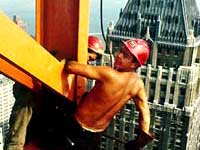HV/Series/Episode/ Work by: Emily Botein · EarSay · Barrett Golding · Kitchen Sisters · Radio Diaries · Judith Sloan

![]() Hearing Voices from NPR®
Hearing Voices from NPR®
098 Working Class: For Labor Day
Host: Barrett Golding of Hearing Voices
Airs week of: 2011-08-31 (Originally: 2010-09-01)
“Working Class” (52:00 mp3):
Our Labor Day weekend welcome to the work week looks at what we do for a living:
Exercises for existential overworked, undervalued employees: a more realistic approach to yogic spiritual awareness for the cubically encased.
Produced by Rebecca Flowers, author of Nice to Come Home To.
Pasquale Spensieri spends his days driving around Brooklyn looking for dull blades. When he rings the bell on his truck, the owners of upholstery shops, restaurants and pizza parlors come out with knives and scissors to sharpen. Pasquale’s father first started sharpening knives during the Depression, with a pedal-operated grinding machine strapped to his back. At that time, there were hundreds of door-to-door grinders in New York. Today, at the age of 71, Pasquale is one of the last. Produced by Joe Richman and Emily Botein (WNYC) for their series New York Works.
Since the 1880s, Mohawk Indian ironworkers have been known for their ability to work high steel. From the Empire State Building to the the World Trade Center, generations of Mohawks have helped shape New York City’s skyline. Each week, they commute to Manhattan from their reservation in Canada, framing the city’s skyscrapers and bridges. In September 2001, after the fall of the Trade Center Towers, the sons and nephews of these men returned to the site to dismantle what their elders had helped to build.
Produced by Jamie York and The Kitchen Sisters (Nikki Silva and Davia Nelson) for their Sonic Memorial Project. Mixed by Jim McKee at Earwax in San Francisco. Thanks to Lynne Beauvais, K103 Kahnawake, Kanien’kehaka Onkwawen:na Raotitiohkwa, National Museum of the American Indian, Elinoar Astrinsky, Elana Berkowitz, City Lore, Tony Field, Andy Lanset, Sound Portraits, Paula Mauro, Jeffrey Jay Foxx, Mike Swamp and Picture Projects. From the CD: Lost and Found Sound and Beyond.
Percussive postal clerks at work, whistling and canceling stamps on the beat, at the University of Ghana Post Office. Recorded by James Koetting in 1975; appeared in the book/CD-ROM Worlds of Music: An Introduction to Music of the World’s Peoples. An mp3 of the entire song is at WFMU
Nassar ElGabry lists some of the many jobs he’s had since coming to the States from Egypt. Recorded by Judith Sloan and Warren Leher, with music by composer Scott Johnson, part of their book/CD project: Crossing the BLVD.
In 1940 two sound recordists, Charles Todd and Robert Sonkin, traveled to the California central valley, the flat, agricultural land Steinbeck wrote of in The Grapes of Wrath. There, hundreds of refugees from Arkansas, Texas and Oklahoma had gathered — an exodus from their drought ridden and Depression ravaged farmlands back home. Dispatched by the Library of Congress, Todd and Sonkin assembled an audio oral history of the lives of these Dust Bowl migrants.
Many made their new homes in Migratory Labor Camps, established by the Farm Security Administration. Despite poverty and displacement, they created a vibrant community. The sounds of their new lives — storytelling, traditional music, community meetings, square dances, and interviews — were captured in these recordings by Todd and Sonkin, lugging a “portable” fifty pound “Presto” disc recorder.
Gallery: Voices from the Dust Bowl w/ original 1940s fieldnotes, photos and mp3s. Recordings archive: Voices from the Dust Bowl: the Charles L. Todd and Robert Sonkin Migrant Worker Collection, 1940-1941 (Teachers Guide). Produced with: Lost and Found Sound. Shorter version on the CD: Best of NPR’s Lost and Found Sound Vol. 1
Photo above: Joe Regis (Mohawk, Kahnawake) and an unidentified ironworker erecting the Chase Manhattan Bank Building in New York, ca. 1960. Courtesy of Bethlehem Steel.
Music: “You Got To Have a Job (If You Don’t Work, You Don’t Eat)” Marva Whitney w/ James Brown , 1969 It’s My Thing. “Hard Work“
John Handy, 1976 Carnival.
“Office Yoga” Rebecca Flowers, visuals by Max Darham
Thank you for the “Walking High Steel” piece today (about 4:15PM on 9/5 here on NJN Radio). It quickly bought me back to some of the men who taught me about work as I started my work life over 50 years ago – Tom, Roy, Alex, Ike, Hal.
But especially Alex. He had worked high steel in New York, but was working at a summer stock tent theater in my home town. I worked there too, and was trying to install a lightning rod atop a 60 foot tent pole. After watching me for a while, Alex quickly walked up the tent cables and helped me. Then he said “You were hanging on too tight. When it’s your time to go, you’ll go”. Just the same statement recorded in your piece.
Many thanks for the reminder, and for having it arrive while we still have the chance to hear NPR in New Jersey. Maybe it’s time for me to stop hanging on to my home state…
this is one of the BEST programs i have heard.
we don`t seem to get this sort of thing in the U.K.
Leave a comment: